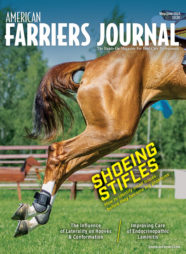More than 50 years after the Horse Protection Act of 1970 became law, soring continues to be a hot-button issue — one that is taking greater prominence after an extraordinary step by lawmakers.
In a letter to Agriculture Secretary Tom Vilsack, nearly half of the United States Senate urges the Department of Agriculture to publish a final rule that aims to stamp out soring. The rule was developed under Vilsack’s leadership during the Obama administration.
“We fervently hope you will swiftly publish the USDA rule promulgated earlier under your leadership that will finally end the conflict-ridden industry self-policing scheme and the use on Tennessee Walking Horses and racking horses of devices integral to soring,” according to the letter signed by 48 senators from both sides of the aisle.
Soring is the practice of inflicting pain on the legs and hooves of horses with caustic chemicals, chains and other objects to artificially create the high-stepping gait known as the Big Lick.
The USDA’s rule largely mirrors the Prevent All Soring Tactics (PAST) Act, which would abolish the Tennessee Walking Horse industry’s ability to police itself. As it relates to farriery, the rule would prohibit the use of all action devices — except certain boots — and all associated lubricants. It also bans all pads and wedges unless prescribed for veterinary treatment on Tennesee Walkers and racking horses.
The rule draft initially prohibited a number of farriery devices, equipment, appliances and practices on “any horse at any horse show, exhibition, sale or auction.” However, many of the farriery-related concerns were dismissed or softened after leaders and members of the American Farrier’s Association and the American Association of Professional Farriers publicly spoke out against them.
There’s no doubt that soring is reprehensible and those who participate should face stiff penalties. Those who stand up for the welfare of the horse should be commended, including the 2 dozen senators who signed the letter. What’s extraordinary, though, isn’t the content of the letter itself. Rather, it’s that the letter is signed by the very same officials who have been elected to create laws that are designed to correct societal injustices.
Momentum toward passing legislation has only been gaining ground in recent years, particularly in 2019 when the House of Representatives approved the PAST Act of 2019 (H.R. 693) in a 333-96 vote. The legislation stalled in the Senate after failing to emerge from the Committee on Commerce, Science and Transportation despite enjoying the support of 51 co-sponsors.
As the ranking member who controls the Senate voting calendar, much of the blame for the PAST Act’s demise has lain at the feet of Sen. Mitch McConnell. The Kentucky Republican also has been a perennial supporter of such competing legislation as the Horse Protection Amendment Act of 2019, which was authored by Sen. Lamar Alexander and Sen. Marsha Blackburn, both Tennessee Republicans. The bill has been consistently dismissed by animal welfare organizations and veterinarians as pandering to the Tennessee Walking Horse industry.
When the 117th Congress took office on Jan. 3, 2021, it was surprising that a new version of the PAST Act had not been introduced. Typically, Rep. Ted Yoho and Rep. Kurt Schrader, both of whom are veterinarians, and Sen. Mike Crapo and Sen. Mark Warner are quick to unveil their legislation.
The 2020 elections seemingly boosted momentum for anti-soaring legislation by ushering President Joe Biden into the White House and Democratic majorities in both houses of Congress. Public support of the PAST Act in both Kentucky and Tennessee hover around 80%. The American Horse Council, U.S. Equestrian Federation, American Veterinary Medical Association, American Association of Equine Practitioners and state veterinary organizations in all 50 states support the legislation. Yet, 48 senators are effectively abdicating their roles as lawmakers to a group of Washington bureaucrats.
Why?
Is it because it’s the path of least resistance? The USDA did much of the heavy lifting in 2016 when it drafted a rule and conducted a series of public hearings around the nation. Despite finalizing the rule, the Obama administration failed to publish it before it was withdrawn by the Trump administration.
Or is it because congressional members don’t have confidence in their ability to pass the bill and send it to 1600 Pennsylvania Ave.? Although Democrats have a razor-thin majority in the Senate, the party does not have the votes to thwart a filibuster. And, considering there are 48 signatures on the letter to Vilsack, that’s three less than those who signed on as co-sponsors to the 2019 PAST Act.
The horse has been integral to the development of the United States. Although its time as a key cog in the nation’s construction is long past, the horse still holds a significant and dear place. Society should take appropriate action to punish those who prioritize selfish gain over the horse’s welfare. Yet, with momentum swinging in the horse’s favor, 48 senators are foregoing their duty to make laws.
Why?
Learn More
Bill Proposes Creation of Federal Animal Cruelty Crimes Division
A trio of Congressmen have introduced bipartisan legislation that aims to create a federal law enforcement division to improve the investigation, application and prosecution of felony animal cruelty crimes.
Horse Soring Rhetoric Amps Up, But Will Change Follow?
As the sun sets on 2020 and the 116th Congress, the verbal jousting intensifies over proposed legislation that aims to fulfill the original intent of the Horse Protection Act — the abolishment of soring.
Humane Society Sues to Compel USDA to Implement Withdrawn Soring Rule
The Humane Society of the United States and its legislative fund have filed a lawsuit in federal court to compel the United States Department of Agriculture to enact a rule that aims to end soring by amending the Horse Protection Act.








Post a comment
Report Abusive Comment